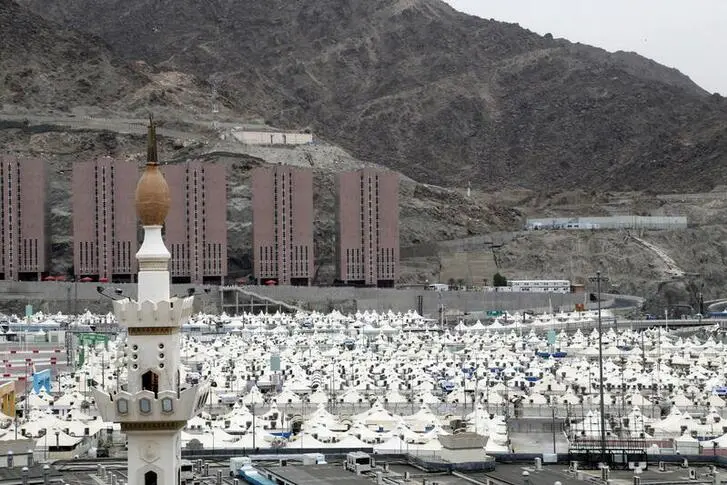PHOTO
At the mosque of Namirah, they will perform combined and shortened Dhuhr and Asr prayers and attend the Hajj sermon, following the steps of Prophet Muhammad (peace be upon him), who delivered his last sermon on the ninth of the same month 10 years after he migrated from Makkah to Madinah.
Last year’s Hajj sermon focused on social solidarity and health precautions for protecting lives against the coronavirus disease (COVID-19).
After sunset, Hajj pilgrims will spend the night in Muzdalifah. Upon their arrival in the holy site, they will perform the Maghrib prayer, followed by a shortened Isha prayer.
Earlier in Mina, there were no major rituals during the Tarwiyah — the day of quenching — so the pilgrims spent their time praying and reflecting until Monday’s sunrise.
Mina, 7 km northeast of the Grand Mosque in Makkah, is the site of the world’s largest tent city, accommodating some 2.5 million pilgrims. However, Saudi Arabia is working on increasing the number of pilgrims that Mina, Muzdalifah and Arafat can hold, under the country’s Vision 2030 reform plans.
Tarwiyah was given its name because on this day, the early pilgrims were instructed to drink a lot of water and fill their leather containers in preparation for moving to Arafat and back to Mina, knowing that water was scarce, and Mina is the closest site to the area of the Grand Mosque, where Zamzam water was available.
Those early pilgrims would also make sure their animals were properly fed and had consumed enough water to help them to travel to their destination. Pilgrims have been following the same custom since Prophet Muhammad performed his only Hajj in 632 CE, a few months before he died aged 62.
Sheikh Abdul Aziz bin Abdullah Al-Sheikh, Saudi Arabia’s grand mufti, has urged all pilgrims to devote their time to the Almighty during the days of Hajj.
He also called on them to adhere to health regulations to prevent the spread of COVID-19.
He added that government and private entities are doing all they can during this year’s Hajj to help pilgrims carry out their religious duty in the best and most comfortable way.
“The efforts are also to ensure the safety of the pilgrims while performing their Hajj rituals in line with the precautionary measures approved by the concerned authorities, aimed for the safety of both the pilgrims and the organizers,” the mufti told the Saudi News Agency.
He added that serving pilgrims and ensuring their comfort is a custom Saudi Arabia and its leaders have always been known for.
For the second consecutive year, the Hajj has been limited to pilgrims from inside Saudi Arabia. The decision was taken to protect them against the pandemic.
Copyright: Arab News © 2021 All rights reserved. Provided by SyndiGate Media Inc. (Syndigate.info).





















